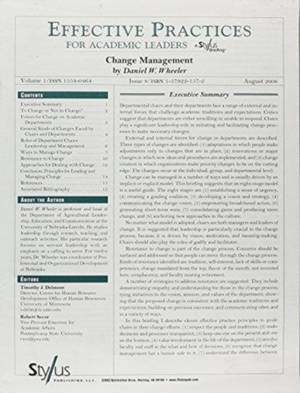
- Afhalen na 1 uur in een winkel met voorraad
- Gratis thuislevering in België vanaf € 30
- Ruim aanbod met 7 miljoen producten
- Afhalen na 1 uur in een winkel met voorraad
- Gratis thuislevering in België vanaf € 30
- Ruim aanbod met 7 miljoen producten
Zoeken
Omschrijving
Executive Summary
Departmental chairs and their departments face a range of external and internal forces that challenge academic traditions and expectations. Critics suggest that departments are either unwilling or unable to respond. Chairs play a significant leadership role in initiating and facilitating change processes to make necessary changes.
External and internal forces for change in departments are described. Three types of changes are identified: (1) adaptations in which people make adjustments only to changes that are in place, (2) innovations or major changes in which new ideas and procedures are implemented, and (3) change creation in which organizations make priority changes to be on the cutting edge. The changes occur at the individual, group, and departmental level. Change can be managed in a number of ways and is usually driven by an implicit or explicit model. This briefing suggests that an eight-stage model is a useful guide. The eight stages are (1) establishing a sense of urgency, (2) creating a guiding coalition, (3) developing a vision and strategy, (4) communicating the change vision, (5) empowering broad-based action, (6) generating short-term wins, (7) consolidating gains and producing more change, and (8) anchoring new approaches in the culture.
No matter what model is adopted, chairs are both managers and leaders of change. It is suggested that leadership is particularly crucial to the change process, because it is driven by vision, motivation, and meaning-making. Chairs should also play the roles of gadfly and facilitator.
Resistance to change is part of the change process. Concerns should be surfaced and addressed so that people can move through the change process. Kinds of resistance identified are tradition, self-interest, lack of skills or competencies, change mandated from the top, flavor of the month, not invented here, complacency, and faculty nearing retirement.
A number of strategies to address resistance are suggested. They include demonstrating empathy and understanding for those in the change process; tying initiatives to the vision, mission, and values of the department; showing that the proposed change is consistent with the academic traditions and expectations; building on previous successes; and communicating often and in a variety of ways.
In this briefing I describe eleven effective practice principles to guide chairs in their change efforts: (1) respect the people and traditions, (2) make decisions and processes transparent, (3) keep one eye on the present and one on the horizon, (4) value involvement in the life of the department, (5) involve faculty and staff in the what and how of decisions, (6) recognize that change management has a human side to it, (7) understand the difference between management and leadership, (8) have a short list of what is really important, (9) invest in having everyone be successful in the change process, (10) be sincere and authentic in whatever you do, and (11) make change management a priority.
Change management is critical to departmental success today and will be even more so in the future. Department chairs need to take the lead in this process.
Departmental chairs and their departments face a range of external and internal forces that challenge academic traditions and expectations. Critics suggest that departments are either unwilling or unable to respond. Chairs play a significant leadership role in initiating and facilitating change processes to make necessary changes.
External and internal forces for change in departments are described. Three types of changes are identified: (1) adaptations in which people make adjustments only to changes that are in place, (2) innovations or major changes in which new ideas and procedures are implemented, and (3) change creation in which organizations make priority changes to be on the cutting edge. The changes occur at the individual, group, and departmental level. Change can be managed in a number of ways and is usually driven by an implicit or explicit model. This briefing suggests that an eight-stage model is a useful guide. The eight stages are (1) establishing a sense of urgency, (2) creating a guiding coalition, (3) developing a vision and strategy, (4) communicating the change vision, (5) empowering broad-based action, (6) generating short-term wins, (7) consolidating gains and producing more change, and (8) anchoring new approaches in the culture.
No matter what model is adopted, chairs are both managers and leaders of change. It is suggested that leadership is particularly crucial to the change process, because it is driven by vision, motivation, and meaning-making. Chairs should also play the roles of gadfly and facilitator.
Resistance to change is part of the change process. Concerns should be surfaced and addressed so that people can move through the change process. Kinds of resistance identified are tradition, self-interest, lack of skills or competencies, change mandated from the top, flavor of the month, not invented here, complacency, and faculty nearing retirement.
A number of strategies to address resistance are suggested. They include demonstrating empathy and understanding for those in the change process; tying initiatives to the vision, mission, and values of the department; showing that the proposed change is consistent with the academic traditions and expectations; building on previous successes; and communicating often and in a variety of ways.
In this briefing I describe eleven effective practice principles to guide chairs in their change efforts: (1) respect the people and traditions, (2) make decisions and processes transparent, (3) keep one eye on the present and one on the horizon, (4) value involvement in the life of the department, (5) involve faculty and staff in the what and how of decisions, (6) recognize that change management has a human side to it, (7) understand the difference between management and leadership, (8) have a short list of what is really important, (9) invest in having everyone be successful in the change process, (10) be sincere and authentic in whatever you do, and (11) make change management a priority.
Change management is critical to departmental success today and will be even more so in the future. Department chairs need to take the lead in this process.
Specificaties
Betrokkenen
- Auteur(s):
- Uitgeverij:
Inhoud
- Aantal bladzijden:
- 16
- Taal:
- Engels
- Reeks:
Eigenschappen
- Productcode (EAN):
- 9781579221577
- Verschijningsdatum:
- 1/08/2006
- Uitvoering:
- Paperback
- Formaat:
- Trade paperback (VS)
- Afmetingen:
- 214 mm x 280 mm
- Gewicht:
- 40 g

Alleen bij Standaard Boekhandel
+ 64 punten op je klantenkaart van Standaard Boekhandel
Beoordelingen
We publiceren alleen reviews die voldoen aan de voorwaarden voor reviews. Bekijk onze voorwaarden voor reviews.








